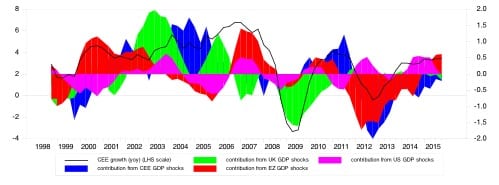FYRUK? Ukoslovakia? Herceg-Engleska?
By yjmsgi3, on 6 July 2016
by Eric Gordy – Senior Lecturer in Southeast European Politics
This post originally appeared on Eric’s personal blog and is reproduced with kind permission of the author.
It has become mildly popular, in the wake of the disastrous referendum in which a small majority of a deliberately misinformed public voted to advise the UK government to leave the European Union, to draw parallels between the future of the UK, which would certainly not survive such a dramatic move, and the recent past of the states of the former Yugoslavia.
There are a few similarities, which might as well be noted. The first of them is that decisions deeply affecting the fate of a great many people were decided after bitter, ethnocentric populist campaigns in a referendum. The second is that they led to the rise into prominence of bizarre and clownish figures from the political margins who would never have a chance if they had to face an informed public or oppose a responsible and engaged elite. And of course the third is that we were able to witness established parties and figures which gave every appearance of being established and cast in stone melt and dissipate as quickly as butter in a skillet awaiting the arrival of a fate-cursed egg.
But there are, after all, more differences. The chronological difference that matters is that in the case of the former Yugoslavia, referenda were demanded by outside actors, undertaken when conditions had already become unsustainable, and regarded as paths to resolution. In the case of the UK the referendum derived from the ongoing social crisis, but predated (by an hour or so) the political crisis. The practical difference that matters is that by the times referenda were held in the Southeast European states, there were already armed groups prepared to affirm or reject the outcome. In the UK, for better or worse, violence has been mostly restricted to small groups of people inspired by the rabble-rousers willing to engage in acts of heroic sacrifice like shooting an MP as she walked out of a library, painting vulgarities on a Polish cultural centre, and sending threatening notes to schoolchildren.
The interesting material is in the space between elements that are similar and elements that are different, where we can see a diverse set of political and social forces trying to push events in one or another direction. The loony right wing of the Conservative party, which Mr Cameron thought he would marginalise in his ham-libidoed miscalculation, is gearing itself up to claim a mandate to govern that it does not have even its own party. Conspirators in the Labour party are doing their best to assure that if the Conservatives go down they will not go down alone. Meanwhile both in London and in Bruxelles a chorus of voices is trying to affirm by repetition the claim that an advisory referendum carries with it inevitable legal finality.
Much of the dispute about whether the outcome of the referendum has to be transformed into basic change – for the worse – in political structures derives from the UK’s idiosyncratic legal system. Its defenders decribe its functioning as an «unwritten constitution,» in which the absence of established rules is compensated by a tradition of interpretation. This contention depends in the first instance on the maintenance of basic stability and continuity in the system, but much more than that on the (invalid) assumption that all participants in the system share similar values and goals. A vocal plurality of EU officials are demanding that the UK government invoke Article 50 of the EU Charter, which would set the actual process of exit in motion. This demand is motivated by a fear of extended uncertainty and the perception that the referendum results reflect a public will that has been expressed and cannot be changed. Inside the country, there is debate over whether invoking Article 50 can be done by the prime minister or must be voted by Parliament, whether the move requires consent of all of the constituent units of the UK, and whether any parliamentary decision could be blocked by the unelected chamber of the parliament or by judicial review.
The principal dilemma here is one that existed in the former Yugoslav cases, but was resolved in those instances principally by force: that is that there are a number of ways of preventing the collapse of the system that are legal, but only one that is legitimate. The legitimate way is to dissolve the parliament and hold new elections, which IF they were won by a party or a coalition pledging a new referendum on the basic of new circumstances and risk, MIGHT result in a repeat of the referendum with a changed result (there are at least five preceedents for this in the short history of EU-related referenda). Vetoes of various types, whether from Scottish parliamentarians, judges or «lords,» are simply tricks that would not address fundamental issues. Legally it could be argued that in a representative system members of parliament have both the authority and the obligation not to follow public opinion when it threatens the integrity of the state, but the political risk of doing this is high enough, and the level of courage among parliamentarians low enough, that this is unlikely to happen. Assuming that the use of force does not shift from thug to systemic scale, this means either new elections or a drawn-out period of confusion, paralysis, weak legitimacy, and decay.
It may be that the most important similarity between the recent violent restructuring of the former Yugoslavia and the coming dissolution of the UK (which will be mostly non-violent, with the violence concentrated on marginalised populations who media and public opinion will systematically ignore) is the parallel set of causes. The earlier set of incidents took place in a part of the world where the managers of a hegemonic ideology had lost the trust of the public and the will to defend their ideas. The present events have their root in a clumsily expressed but similar type of public rejection, in which the greatest proportion of working class support for exit came from people who saw their vote as an act of «rebellion,» and who perceived their own interests as ignored in a political and economic system that over a long period disinvested in their livelihoods, withdrew support for their social needs, and symbolically treated them as marginal. In both instances high levels of social dissatisfaction resulted in the emergence of new political orders which would marginalise the people who supported them even further.
If people in our profession were cynical and self-seeking, they would be pleased with this course of events. Lots of jobs for Balkanologists and involuntary specialists in acquises communitaires and other such strange creatures! Mostly, though, we are not, because we know a little bit about the effects of manufactured disorder, socially approved violence, and recombinant structures of hatred.
Views expressed are those of the author(s) and do not necessarily reflect those of SSEES, UCL, or SSEES Research Blog.
 Close
Close










